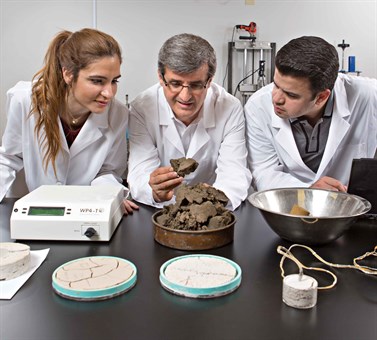 Dr. Marcelo Sanchez, associate professor in the Zachry Department of Civil Engineering at Texas A&M University, and his team of researchers are paving the way for new engineering applications that will shape the future of energy production and storage. From new possibilities in geothermal and hydrocarbon resources to better storage applications for nuclear energy, the implications of this research are exciting and far reaching.
Dr. Marcelo Sanchez, associate professor in the Zachry Department of Civil Engineering at Texas A&M University, and his team of researchers are paving the way for new engineering applications that will shape the future of energy production and storage. From new possibilities in geothermal and hydrocarbon resources to better storage applications for nuclear energy, the implications of this research are exciting and far reaching.
Although soils and rocks are hardly viewed as groundbreaking, exploring the untapped potential of geomaterials like these is the primary goal of Sanchez and his team. The team is studying the behavior of geomaterials under complex conditions involving thermal, hydraulic, mechanical and geochemical actions. Through the team’s research it hopes to make possible both the production of new energy sources and also the safe storage of nuclear waste.
This field of study, known as geotechnics, is particularly important because of the increase in future energy demands associated with economic development and population growth worldwide. This type of research plays a crucial role in the continuing development of the design of nuclear waste repositories, advancing the design of geological carbon-dioxide sequestration and enhanced geothermal systems, and assisting energy production from existing and new sources.
The interest in these applications is relatively new, so the response of soils and rocks in extreme environments was not well known prior to recent progress in research. The team from Texas A&M has contributed with new experimental evidence and advanced numerical models to expand the previously limited range of existing knowledge in this area.
Previous models in this field have disregarded the effect of the material fabric on the analyses involving geomaterials subjected to extreme circumstances. This cannot be considered valid, however, when dealing with complex geomaterials like expansive clays, hydrate bearing sediments and fractured soils and rocks. The research conducted by Sanchez and his team focuses on enhancing the capability of the existing tools by incorporating the details of micro-scale geomaterial into the macroscopic models.
By inserting the microscopic details, the researchers have been able to begin bridging the gap between micro-scale geomaterial behaviors and macro-scale engineering problems like storing nuclear waste, producing geothermal energy and more. The numerical models produced at Texas A&M have been recognized for their advanced and vigorous approaches that explicitly consider both the micro- and macro-scale structures in clayed materials.
In addition to these advances, the team has also developed a state-of-the-art model for sediments containing gas hydrates and proposed a novel numerical technique to model pre-existing and evolving cracks in geomaterials.
The challenges created by the ever-increasing demand for energy solutions, as well as for resilient and sustainable civil infrastructure, continuously expand the need for more advanced knowledge of soil and rock behaviors. Driven by these societal needs and the engineering applications associated with them, the researchers at Texas A&M painstakingly study the response of geomaterials subjected to unprecedented solicitations.
This involves researching high thermal gradients, very large fluid pressures, and significant confinement stresses. Thermal gradients involve heat shocks above 400 degrees Fahrenheit investigated in geothermal and nuclear waste disposal related applications. The fluid pressure studies consist of pressures above 25 mega pascal, which is approximately 247 times regular atmospheric pressure. High confinement applications are vast, from nuclear waste disposal to truly anything located deep in the ground requiring high stress.
“Geomechanics is at the core of the modern infrastructure and energy challenges and our group is working hard to keep Texas A&M at the forefront of the research advances,” said Sanchez.
Contributing author: Ryan Terry